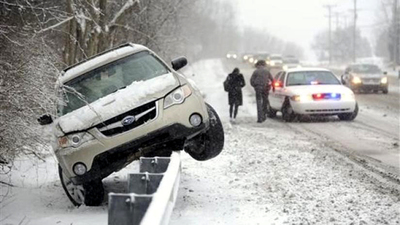True or False: Americans Know It All About Winter Driving
NASHVILLE, TN - January 30, 2017: Winter is here in full force, and with it comes a variety of winter-weather hazards on the roads. Half of Americans have found their car stuck or buried in snow; therefore, it is important to keep your car care knowledge as fresh as the snow on the ground. The latest Hankook Tire Gauge Index took a look at some of the major misconceptions that Americans have when it comes to winter car care and driving.
True or False? It's best to let your car warm up before you start driving.
False. When those bitter winter temperatures hit, it's common to see people idling in their cars, waiting to warm up the engine –
and their seats! According to the Gauge, 82% of Americans believe it is best to let your car warm up before you hit the road. However, your car will warm up much faster while driving at a normal operating speed; idling does very little to
actually warm up the engine and instead wastes gas.
True or False? Gas in your tank can freeze if you leave your car outside in extreme cold conditions.
True and False. The gas in your car's tank will not freeze if you leave your car outside in extreme cold conditions,
which should ease the minds of the 35% of Americans who think it will. However, there is a chance that the condensation inside the gas tank can freeze, which might damage your fuel line. Keep the tank at least half full to prevent a fuel line
freeze if you park your car outside this winter.
True or False? If your car begins to slide, apply sharp braking and quick counter steering to correct the car's position.
False. About 1 in 4 Americans could use a defensive driving refresher, as 22% of drivers incorrectly
believe sharp braking and counter steering will help correct a skidding car's position. Half of Americans (51%) have skidded off the road at some point, so if you find yourself in that slippery situation, experts at DefensiveDriving.com
suggest that you steer into the skid, and keep your foot off the gas and brake. Begin to accelerate or apply the brakes only when you regain control of the car.
True or False? Your vehicle's tire pressure can fluctuate due to changes in outdoor temperature.
True. Most Americans (94%) know that a vehicle's tire pressure can fluctuate due to changes in outdoor temperatures, so be
sure to keep an eye on your tire pressure this winter. The general rule is that for every 10 degrees Fahrenheit that the temperature changes, your tire pressure will change about 2%, and if left unchecked, underinflated tires can shorten the
tread life and reduce fuel economy.
True or False? All-season tires aren't designed to handle snow.
True and False. Two thirds (67%) of Americans think that all-season tires are equipped for snow. While they can certainly handle mild winter conditions,
for those in particularly snowy climates, winter tires like Hankook's Winter i*cept evo2 provide even greater traction for keeping drivers safe in the snow.
The Hankook Tire Gauge Index is a quarterly survey of Americans that uncovers their attitudes and opinions about all things related to driving. The winter installment of the survey, conducted December 2-4, 2016, polled 1,022 randomly selected Americans.
About Hankook Tire America Corp.
Hankook Tire America Corp. is a growing leader in the U.S. tire market, leveraging investments in technology, manufacturing and marketing to deliver high quality, reliable products that are safer
for consumers and the environment. Headquartered in Nashville, Tenn., Hankook Tire markets and distributes a complete line of high performance and ultra-high performance passenger tires, light truck, SUV tires,
as well as medium truck and bus tires in the United States.



